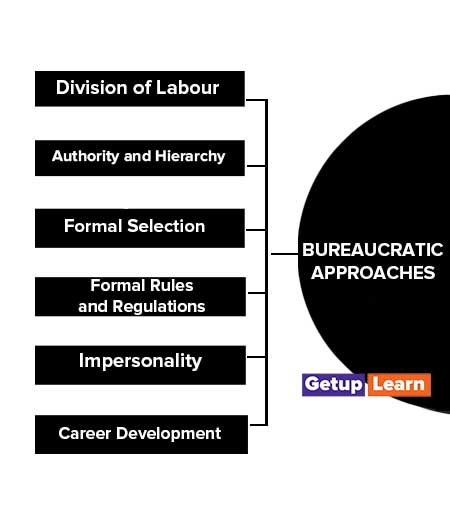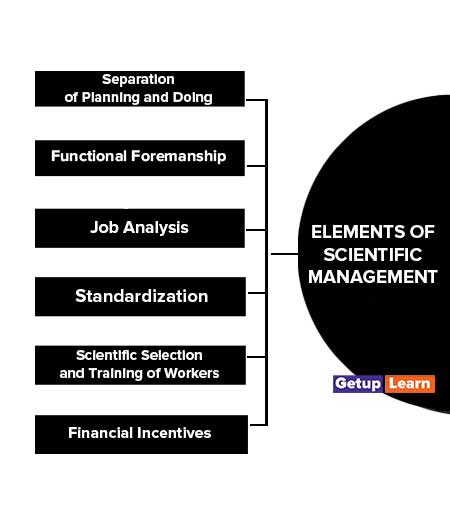Management involves a wide variety of activities. Theorists and academic authors have contributed to the study of management. There are a variety of writings available on management techniques.
The various approaches to management and differing views have only added to the confusion about what management is all about. It isn’t surprising to know that a highly respected author had called the situation “the management theory jungle.”

Table of Contents
Approaches to Management
Management knowledge is as old as human civilization. But from the beginning of the 20th century, serious efforts were made to develop management as a separate discipline. The contribution of Taylor, Gantt, Gilbreth, Emerson, Henri Fayol, Sheldon, Mooney, Mary Parker and Max Weber gave birth to the classical approach to management.
From this classical approach, the development of management thought started. Then the neo-classical approach evolved. The contributors to this approach attempted to study human relations and human behaviour in the organization. Some advocates of this approach were Elton Mayo, Douglas McGregor, Mary Parker, Chester Bernard etc.
After the neo-classical approach, there evolved the modern approach. The evolution of management thought is a continuous process and newer approaches like the system approach and contingency approach are developed in the present era.
- Classical Approach
- Scientific Management Approach
- Administrative Approach to Management
- Bureaucratic Approach to Management
Classical Approaches to Management
The classical approaches to management include mainly the scientific approach and administrative and bureaucratic approaches. Classical thoughts or traditional thoughts of management evolved in the late 1800s and early 1900s.
These approaches mainly focused on the attainment of efficiency and productivity undermining the role of the human in it. The major postulates of classical theories are as follows:
- The classical approaches focus on means to improve the output of the organisation. More emphasis was given to the economic rationality of the individual employee considering that the individual always chooses to maximise their individual economic rewards. The approach clearly gives node to Adam Smith’s ideology. He opined that monetary incentives can make individual gives their best to realise their potential.
- The classical theorist heavenly relied on the human element to make radical changes in productivity. Sometimes the human aspect was compromised over the economic aspect. This mechanical approach to the business was criticised on many occasions.
- Most of the classical thinkers were of the view that individual employees should always be in a tight compartment of rules and regulations so as to realise the organisational priorities. Thus more emphasis was on making rules and regulations keeping in view the functional approach.
Advantages of Classical Approaches to Management
The following are the advantages of classical approach to management:
- The classical approach offers a convenient framework for the education and training of managers.
- The observational method of case study is helpful in drawing common principles out of past experience with some relevance for future application.
- It focuses attention on what managers actually do.
- This approach highlights the universal nature of management.
- It provides a scientific basis for management practice.
- It provides a starting point for researchers to verify the validity and improve the applicability of management knowledge. Such knowledge about management is effectively presented.
Disadvantages of Classical Approaches to Management
The following are the disadvantages of classical approach:
- Weber’s ideal bureaucracy suggested strict adherence to rules and regulations, which led to red-tapism in the organization.
- It offers a mechanistic framework that undermines the role of the human factor. The classical writers ignored the social, psychological and motivational aspects of human behaviour.
- The environmental dynamics and their effect on management have been discounted. Classical theory viewed organization as a closed system i.e. having no interaction with the environment.
- There is a positive danger in relying too much on past experiences because a principle or technique found effective in the past may not fit a situation of the future.
- The classical principles are mostly based on personal experience and limited observations of the practitioners. They are not based on personal experience.
- The totality of real situations can seldom be incorporated into a case study.
Scientific Management Approach
The impetus for the scientific management approach came from the first industrial revolution. Because it brought about such an extraordinary mechanization of industry, this revolution necessitated the development of new management principles and practices.
The concept of scientific management was introduced by Frederick Winslow Taylor in the USA at the beginning of the 20th century. He defined scientific management as,” Scientific management is concerned with knowing exactly what you want men to do and then see that they do it in the best and cheapest way”.
Elements of Scientific Management
Elements of Scientific Management: The features of various experiments conducted by Taylor are as follows:
- Separation of Planning and Doing
- Functional Foremanship
- Job Analysis
- Standardization
- Scientific Selection and Training of Workers
- Financial Incentives
Separation of Planning and Doing
Taylor emphasized the separation of planning aspects from the actual doing of the work. The planning should be left to the supervisor and the workers should emphasize on operational work.
Functional Foremanship
Separation of planning from doing resulted in the development of a supervision system that could take planning work adequately besides keeping supervision on workers. Thus, Taylor evolved the concept of functional foremanship based on the specialization of functions.
Job Analysis
It is undertaken to find out the best way of doing things. The best way of doing a job is one which requires the least movement and consequently less time and cost.
Standardization
Standardization should be maintained in respect of instruments and tools, period of work, amount of work, working conditions, cost of production etc.
Scientific Selection and Training of Workers
Taylor has suggested that the workers should be selected on a scientific basis taking into account their education, work experience, aptitudes, physical strength etc.
Financial Incentives
Financial incentives can motivate workers to put in their maximum efforts. Thus, monetary (bonus, compensation) incentives and non-monetary (promotion, upgradation) incentives should be provided to employees.
Criticism of Scientific Management
The main grounds for criticism of scientific management are given below:
- Taylor advocated the concept of functional foremanship to bring about specialization in the organization. But this is not feasible in practice as a worker can’t carry out instructions from eight foremen.
- Workers were hired on a first-come, first-hired basis without due concern for workers’ abilities or skills.
- Scientific management is production oriented as it concentrates too much on the technical aspects of work and undermines the human factors in the industry. It resulted in a monotony of jobs, loss of initiative, overspeeding workers, wage reductions etc.
- The training was haphazard at best, with only minimal use of the basic apprentice system.
- Tasks were accomplished by the general rule of thumb without standard times, methods or motion.
- Managers worked side-by-side with the workers, often ignoring the basic managerial functions of planning and organizing.
Read Also: Henri Fayol 14 Principles of Management
Administrative Approach to Management
The credit for developing the administrative theory of management goes mainly to Henri Fayol. Henri Fayol was born in 1841 in France. He studied engineering in France. He worked first as a mining engineer in a large French mining and metallurgical company.
Later on, he became its Managing Director. Based on his rich administrative experience he wrote a monograph titled as General and Industrial Management, published in the UK. It is a short book containing four parts. The first part deals with the classification of business activities.
The second part deals with the basic functions of management performed by managers in all types of organizations. The third part deals with 14 principles of management. The fourth part deals with managerial qualities and skills.
Henri Fayol Principles of Management
Fayol made it clear that these principles were flexible and capable of adoption to every need. These Henri Fayol principles of management are briefly discussed below:
- Division of Work
- Authority and Responsibility
- Discipline
- Unity of Command
- Unity of Direction
- Subordination of Individual Interests to General Interest
- Remuneration
- Centralization
- Scalar Chain
- Order
- Equality
- Stability of Tenure of Personnel
- Initiative
- Espirit Corps

Division of Work
It involves dividing the work among various departments and employees according to their abilities and skills. The object of this principle is to obtain the benefit of specialization i.e. produce more and better goods.
Authority and Responsibility
Authority must be in proportion to responsibility. Authority and responsibility should go together. When managers are given authority, their responsibility should also be decided.
Discipline
Discipline means obeying and respecting the rules of the organization. Fayol considered discipline absolutely essential for the smooth running of the business. For maintaining discipline there should be good supervisors at all levels, clear and fair agreements with employees and judicious use of penalties.
Unity of Command
This principle states that every employee should receive orders from one Supervisor only. Dual command leads to confusion and conflict.
Unity of Direction
According to this principle, “there should be one head and one plan” for a group of activities having the same objective.
Subordination of Individual Interests to General Interest
The interest of any one employee or group of employees should not proceed over that of the concern. Individual employees should not give priority to their own interests; rather they should work for the interest of the organization.
Remuneration
Employees should get fair remuneration for their services. Fair remuneration provides satisfaction to both the employees and the firm.
Centralization
This principle refers to the extent to which authority should be centralized or decentralized in an organization. The degree of centralization depends upon individual circumstances. It should be such to give the best results to the organization.
Scalar Chain
The line of authority from top management to the lowest management is known as the scalar chain. Orders and feedback follow this chain. It creates a superior-subordinate relationship among the employees in the organization. For effective management, the scalar chain should be as short as possible.
Order
For ensuring a smooth flow of work and efficient use of physical and human resources, people and materials should be in the right place at the right time. Everything and everyone should be in the right places.
Equality
This principle states that managers should give equal, fair and kind treatment to their employees.
Stability of Tenure of Personnel
Since instability is both the cause and effect of bad running, the management should provide stability of employment to its personnel. This will create a feeling of security among the employees and reduce their tension.
Initiative
Management should allow the employees to develop and use initiative for ‘solving work-related problems’. This will help employees to develop better in the organization.
Espirit Corps
According to this principle, “unity is strength”. Managers should, therefore, try to build team spirit and unity among the employees for achieving the organizational goals.
Management principles have universal applications. Some of Fayol’s principles have stood the test of time and have been reproduced in almost all standard books on general management and organization theory.
Bureaucratic Approach to Management
Max Weber (1864-1920) is the main contributor to the bureaucratic approach to management. Weber’s idea of bureaucracy intended to develop methods to eliminate managerial inconsistency leading to ineffectiveness. He was against the ill effects of power being exercised in the organisation.
He advocated the development of structure, hierarchy, formal rules and regulations, and responsibility for everything in an organisation. He propounded 6 principles of bureaucratic management as discussed below:
- Division of Labour
- Authority and Hierarchy
- Formal Selection
- Formal Rules and Regulations
- Impersonality
- Career Development

Division of Labour
Max Weber was of the view that the division of work should be based on the labour or efforts required to perform the job, not a quantitative division.
There should be a proper alignment of authority and hierarchy in an organisation. The authority should be delegated to subordinates in order of hierarchy.
Formal Selection
The formal selection is given priority over the scientific selection. He was of the view that equal opportunity must be given to every eligible candidate. This needs things to be organised in a formal manner.
Formal Rules and Regulations
There should be clearly laid down rules for everything. Be it small activity or a big one, the model guidelines must be followed in order to ensure proper implementation.
Impersonality
The impersonality at each level is necessary to gain the belief of the common man who wants things in a proper manner. Honesty is the system that must be inculcated to implement formal rules and regulations.
Career Development
The system must show a career growth path. The employee should get equal opportunities for career development.
Read More About: Bureaucratic Approach: Systems, Characteristics, Criticism
What are the approaches to management?
The following are the approaches to management:
1. Classical Approach
2. Scientific Management Approach
3. Administrative Approach
4. Bureaucratic Approach.
What are the elements of scientific management?
The following are the elements of scientific management:
1. Separation of Planning and Doing
2. Functional Foremanship
3. Job Analysis
4. Standardization
5. Scientific Selection and Training of Workers
6. Financial Incentives
What are Henri Fayol’s 14 principles of management?
The following are the Henri Fayol principles of management:
1. Division of Work
2. Authority and Responsibility
3. Discipline
4. Unity of Command
5. Unity of Direction
6. Subordination of Individual Interests to General Interest
7. Remuneration
8. Centralization
9. Scalar Chain
10. Order
11. Equality
12. Stability of Tenure of Personnel
13. Initiative
14. Espirit Corps.
What is bureaucratic management?
Bureaucratic management refers to a management style characterized by a highly centralized and structured organization, with a clear hierarchy and a strong emphasis on rules and regulations.
What are the bureaucratic approaches to management?
The following are the bureaucratic approaches to management:
1. Division of Labour
2. Authority and Hierarchy
3. Formal Selection
4. Formal Rules and Regulations
5. Impersonality
6. Career Development.















